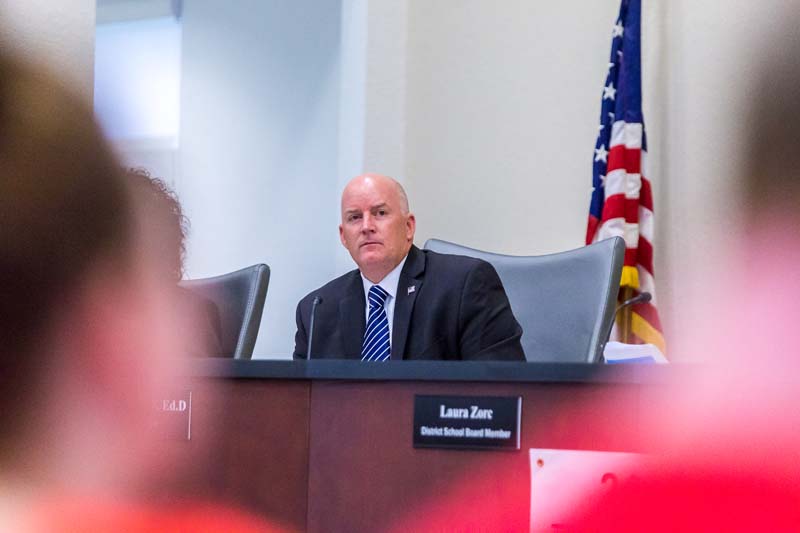Despite problems and failures at the Indian River County School District under his leadership, Superintendent Mark Rendell is getting a raise. The only question is how much.
Rendell recently pushed through a $1,200-a-year increase for upper-level management – principals and above on the organizational chart – and at a recent workshop a couple of board members said that should be the raise he gets as well.
But one board member – Tiffany Justice – pushed for a bigger increase for Rendell, and board Vice Chairman Charles Searcy seemed to agree.
“Several superintendents around the state are getting raises,” Justice said, claiming proposed legislation could eliminate elected superintendents, leaving only board-hired superintendents. “Appointed supervisors will be in demand. Perhaps we need to renegotiate his contract for additional money.”
“We got some pretty good grades over the last three years and we need to reward him,” Vice Chairman Charles Searcy said.
Board Member Laura Zorc said she was “satisfied” with the $1,200 bump and wouldn’t consider a bigger raise unless Rendell’s whole contract was opened up for renegotiation. Board Member Dale Simchick agreed.
Board Chairman Shawn Frost did not express an opinion on the matter at the workshop and declined to comment when asked afterward.
Despite Searcy’s statement, grades in traditional schools in the District, the key measurement of Rendell’s success, leave much to be desired.
If grades in the charter schools, which Rendell does not control, are factored in, the District does about average. Take those good schools out of the mix though and the District consistently comes in below average – sometimes far below.
For instance, Algebra 1 is required for a standard high school diploma. The state pass rate for that course was 62 percent last year while Vero Beach High School’s pass rate was 26 percent and Sebastian River High School’s was only 37 percent.
The district’s Florida Standard Assessment scores for middle school students also lagged behind state averages – and Florida is not a high-ranking state in educational achievement, coming in 28th nationwide in a recent assessment. The eighth-grade English Language Arts pass rate was 50 percent compared to 55 percent statewide. In math the traditional eighth grades averaged a 42 percent pass rate compared to the state’s 46 percent pass rate.
Third-grade scores are considered predictive of future academic and life success and by that measure, Indian River County did not shine last year. The 13 traditional elementary schools had an average 55 percent pass rate for the English Language Arts assessment, which was 3 points below the state’s less-than-stellar 58-percent pass rate.
Traditional-school third-grade math scores were similarly lackluster, with a 59-percent pass rate compared to the state’s 62-percent pass rate.
While student achievement has lagged, Rendell’s budget has increased, from $268 million his first year, to nearly $287 million this year, with very little transparency or reporting to account for much of the spending.
Staff turnover is up as well, while morale is down.
Both the teachers’ union contract, representing about 1,100 teachers, and the Communications Workers of America union contract, representing about 700 workers, went to impasse last year. The teachers didn’t get a raise and the CWA workers got about $500 more per year this year. At the same time, the CWA workers’ yearly bonuses were discontinued and health insurance costs shot up, meaning most workers are taking home less now than when Rendell was hired.
Probably no coincidence, nearly 20 percent of teachers left the district last year – high even in Florida, which is ranked as one of the worst states for teacher retention, 45th among 50 states – with some schools losing more than 30 percent of those responsible for educating children.
Despite those and other troubling statistics, Justice and board member Dale Simchick gave Rendell a 4, the highest possible score, on his most recent evaluation and Justice thinks the board should give him a substantial raise to keep from losing him to another district.
Rendell is currently scheduled to be evaluated by the board in late July, but the board could move that up and decide on a raise sooner.
Rendell was asked by Searcy at the workshop how much he makes. The superintendent didn’t answer, but a public records request revealed it is $162,000 a year.
If the board awards him the same $1,200 raise other administrators are getting, that would bump his salary up to $163,200.

